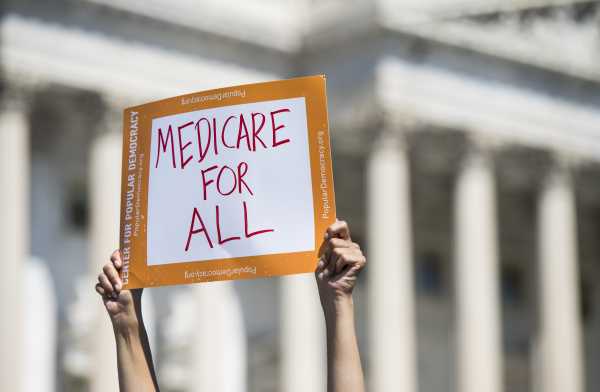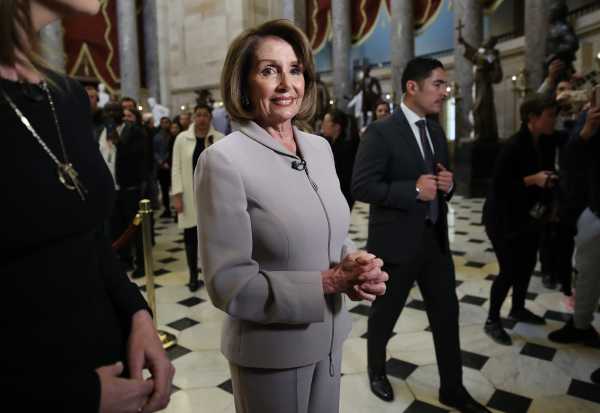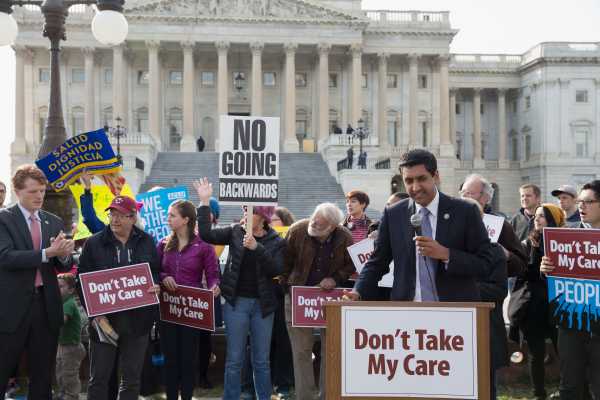
After Republicans ran up the federal deficit by $1 trillion, House Democrats want to establish themselves as the party of fiscal responsibility.
House Democratic leaders want to institute a “pay as you go,” or PAYGO, rule for the next two years. The rule means any legislation increasing mandatory spending (like entitlement programs) or cutting taxes — and therefore increasing the deficit over the next 10 years — would have to be offset with budget cuts to mandatory spending or tax increases. The rule can only be waived with a majority vote.
But for some House Democrats, particularly progressives who want to pursue ambitious new ideas like a Green New Deal, requiring budget cuts or tax increases to pay for them is galling.
At least three Democratic lawmakers — Reps. Ro Khanna (CA), Tim Ryan (OH), and newly elected progressive Alexandria Ocasio-Cortez (NY) — have spoken out against the rule change.
“It is terrible economics,” Khanna tweeted, saying he would vote against the House Democratic rules package. He added: “PayGo would be a terrible policy that unilaterally disarms the incoming Democratic majority’s ability to govern.”
House Democratic leaders are trying to walk a fine line. They are both publicly backing a progressive agenda, as the party’s grassroots rallies around policies like Medicare-for-all, and crediting the House majority to some of the most moderate Democratic lawmakers, a substantial contingent of whom just unseated Republicans in historically conservative suburban districts. For them, PAYGO is a nod to the fiscally conservative constituency.
But to progressives, PAYGO is like trying to fit progressive talking points into a Paul Ryan-esque worldview, where only balanced budgets and austere entitlement cuts lead to economic growth. As Democrats gear up for a presidential election against Donald Trump, some Democrats are left wondering why the party is letting Republicans write the script on the economy.
“The message [Democratic leaders] are sending is that we as a party, Democrats, stand for fiscal discipline,” Stephanie Kelton, a progressive economist with Stony Brook University, said. “What I hear is that Democrats are willing to prioritize budget outcomes over human ones.”
What it means to pay as you go

The fundamental idea behind a PAYGO — or “pay as you go” — rule is to keep the rate at which the deficit is growing in check; the government offsets every dollar spent expanding mandatory programs, like Medicare or food aid, with a budget cut or tax increase.
“PAYGO is not going to change the deficit,” Jason Furman, a Harvard University economist who was President Barack Obama’s top economic adviser, explains. “It’s a macroeconomic view that the world is okay at a deficit of 4 to 6 percent of GDP but not okay at 8 percent.”
PAYGO first became law in 1990, as a way to rein in the deficits of the 1980s. But Presidents Bill Clinton and George W. Bush waived the law during periods of major economic growth. By 2002, Congress let PAYGO expire entirely, allowing for the Bush administration to sign in another round of tax cuts in 2003.
When the deficit started growing again in 2007, Congress enacted PAYGO rules internally. Three years later, in 2010, Obama signed PAYGO into law again. The Senate maintained its PAYGO rule, but House Republicans did not. They instead implemented a “cut as you go,” CUTGO, rule in 2011, which required mandatory spending increases to be offset with cuts to mandatory spending alone, allowing for tax cuts to go unpaid for. The House and Senate waived the 2010 PAYGO law for the Republican tax bill in 2017.
There is an important distinction between PAYGO as law and House Democrats’ proposed PAYGO rule — the statute is much more draconian than what Democrats have included in their rules.
Statutory PAYGO means the Office of Management and Budget keeps an account of every piece of legislation that impacts revenue or mandatory spending. At the end of each calendar year, OMB checks the scorecard — if it increases the estimated deficit, then OMB is required to implement an across-the-board sequestration of mandatory spending programs to offset the cost.
Medicaid, Social Security, food stamps, and all social safety net programs are exempt from this sequestration. But Medicare, the Social Services Block Grant, student loans, and mandatory spending in the Affordable Care Act (other than exchange subsidies and Medicaid expansion), among others, are included in the sequester. Cuts to Medicare are capped at 4 percent, about $25 billion per year, meaning cuts to the other mandatory spending programs would have to make up the difference. Since the law’s passage in 2010, this kind of sequester has never gone into effect.
Progressives want to know why they have to pay for their policies now when Republicans didn’t have to pay for tax cuts

The politics of pay-as-you-go rules is best explained by the instances the rule has been waived. When it comes to tax cuts, PAYGO appears to be an insignificant hurdle to overcome. The 2001, 2003, and 2017 tax cuts, all passed under Republican administrations, were not paid for. PAYGO was simply waived.
This fits into the conservative worldview, where tax cuts pay for themselves but entitlement programs are a drain on the economy. (It’s important to remember that the Congressional Budget Office and Joint Committee on Taxation reports on the GOP tax bill in 2017 said the cuts would not pay for themselves.) But when it comes to government programs like health care, Republicans and fiscally conservative Democrats have an issue; they want to see offsets.
The Affordable Care Act, a.k.a. the ACA or Obamacare, is perhaps the best example of this. Fiscally conservative Democrats made budget neutrality a main condition of their support. Regardless of the PAYGO law, Robert Greenstein, the founder and president of the Center on Budget and Policy Priorities, who worked closely with Democratic lawmakers during the ACA negotiations, said the bill “didn’t have the votes if it wasn’t paid for. Period. End of story.”
This is the core of progressives’ complaint. They want to know why they have to rein in their boldest policies when Republicans have been able to pass tax cuts unfettered by budget rules.
Alexandria Ocasio-Cortez, the newly elected New York Democrat, called PAYGO “a dark political maneuver designed to hamstring progress on healthcare” on Twitter.
Rep. Tim Ryan (D-OH) shared the concern: “Critical investments in education, infrastructure, and health care should not be held hostage to budgetary constraints that Republicans have never respected,” he said. Discretionary spending, like investments in infrastructure and education, would not be subject to PAYGO, however.
Khanna is asking both why the conversation about offsets can’t come later and why Democrats aren’t defining what economic growth means in the same way Republicans do.
“We shouldn’t have to argue over offsets for every piece of legislation,” he told Vox. “We should make it clear that our policies will lead to growth and that’s how, long term, we will avoid uncontrollable deficits.”
Paying for big ideas is politically really hard
Big policy ideas eventually have to be paid for.
“You can’t have government spending and taxes constantly diverging from each other,” Harvard’s Furman said. “If you have a $100 billion program, you can either pay for it today or pay for it 20 years now.”
PAYGO means having the difficult conversation first. And how difficult is this fight? Look at Republicans’ Obamacare repeal debate; they tried to pay for a tax cut by cutting roughly $800 billion from Medicaid over 10 years — a move that ultimately tanked the debate altogether. When it came to tax cuts, any move to substantially raise revenue made the bill unpassable, so they ditched the effort altogether.
This dynamic is likely why Sen. Bernie Sanders’s Medicare-for-all bill doesn’t include firm offsets. Getting every Democrat on board with a massive tax hike, even on the 1 percent, will very likely be a political battle royal. (Sanders’s plan included a list of revenue-raising proposals.)

That’s why progressives say PAYGO will hamstring their policy ideas. They want to declare it a social and economic good first and fight later. Many still argue that adherence to PAYGO during the 2010 health care debate weakened the final health care bill and opened it to Republican attacks in the years ahead.
“We should first pass policies that have broad public support,” Khanna said. “Then we can in conference make sure revenue is raised through taxing the one percent or cutting money for bad wars.”
In 2010, Greenstein noted the result of the budget neutrality debate was some progressive offsets: For example, the ACA included taxes on wealthy people’s investment income. “You could advance a progressive agenda not only in how you expend money but how you pay for it,” Greenstein said.
At the end of the day, everyone acknowledges that there is statutory PAYGO that can only be waived with Republican votes. But the House rule still matters. It means Democrats have to have to negotiate within their ranks.
“It’s obviously important symbolism,” Furman said, adding that he understands the reluctance to constrain the party’s boldest, smartest policy ideas. He still thinks it’s unrealistic. “But a lot of what Congress thinks of isn’t your very best-thought-out idea, so thinking how you are going to pay for it is a good idea.”
Democrats: the new party of fiscal responsibility?
Republicans make the attack often: Democrats, they say, are loose with the nation’s purse strings and undisciplined about the national debt. But over the past two years, Republicans, with full control of Congress and the White House, have abandoned their fiscal conservatism. In October 2018, the Treasury Department reported that the federal deficit grew to $779 billion this year under Republican leadership — a 17 percent increase from 2017 and the largest deficit since 2012, when the country was still seeing the effects of the recession.
After listening to Republicans sound the alarm about the growing deficit and national debt for decades, Democrats flipped the script. Fiscal responsibility became one of their winning messages in moderate suburban districts across America. House Democratic leadership believes in the political salience of this message.
“Acknowledging the value of fiscal responsibility helps many of our frontline colleagues,” one top Democratic congressional aide said.
But the PAYGO debate raises an important tension in the Democratic Party. Moderate Democrats are joining a House Democratic conference that’s moved increasingly to the left over the past two years. That energy will only be amplified over the next two years, as the party prepares for a presidential election.
“This is centrist policy at this point,” Kelton said. “This throws sand in the gears in the energy behind some of these things.”
Progressives don’t want the party to just pick up the talking points — they want Democrats to adopt the vision.
“It’s handing the Republicans a talking point every time we seek a waiver [to PAYGO],” Khanna told Vox. “We are stuck in their frame of trying to balance budgets. We need to speak the language of growth of progressive policies.”
Sourse: vox.com






